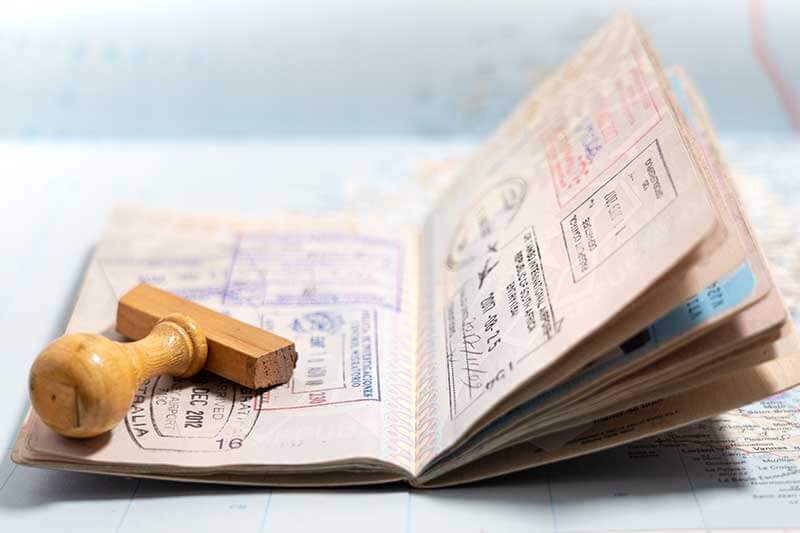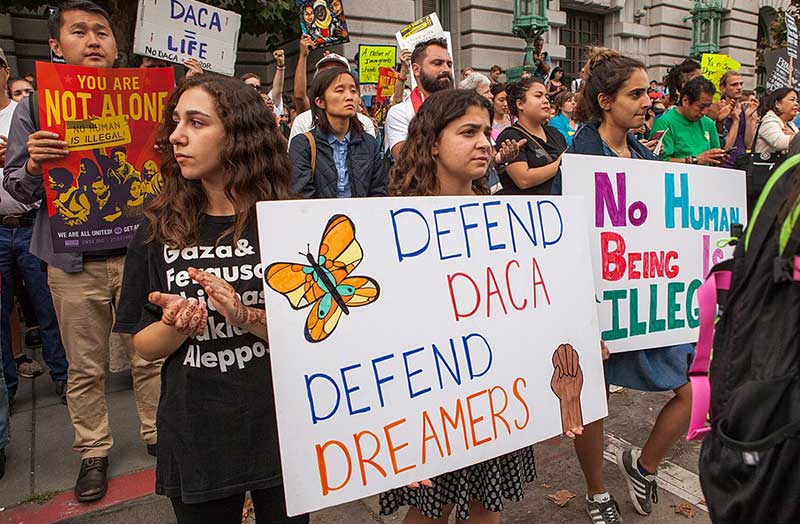Through DACA, it is possible to delay the deportation of immigrants who came to the United States as children. However, this protection is temporary and does not automatically apply to immigrants.
If you believe you qualify for DACA, you must first submit an application to obtain this immigration relief. If approved, you will be protected from deportation for a certain period of time. In addition, you must renew it when necessary to prevent it from expiring.
Our immigration lawyers in Los Angeles recommend having legal representation for this. For example, the help of one of our professionals from the Lluis Law office. Call us today to review your case.
LATINOS WITH OVER 50 YEARS EXPERIENCE
Tell Us Your Case
Table of Contents
What Is The DACA Program For The United States And What Is It For?
Deferred Action for Childhood Arrivals (DACA) is a U. S. immigration policy. This regulation protects young people (“DREAMers”) who entered the United States illegally as children from deportation.
It should be noted that DACA does not give you any legal status or a direct path to becoming a U. S. citizen. However, it does allow you to apply for a social security number, work permit, and driver’s license.
DACA Program Timeline

To understand a little better about this program, let’s look at its chronology or history:
- The DACA program emerged after Congress failed to pass the Development: Relief and Education for Alien Minors (DREAM) Act proposed by Barack Obama. This law was intended to grant legal status to young immigrants residing in the United States.
- In the absence of legislative support, Obama implemented DACA in 2012 through an executive order as an interim measure.
- In 2017, admission of new applications to join DACA was discontinued.
- In July 2021, a court determined that DACA is “a violation of the law.”
- By October 2022, an appeals court affirmed that this program was illegal.
- That same year, the Department of Homeland Security (DHS) announced the Final Rule for DACA, designed to preserve and strengthen the policy. This law, based on regulations 8 CFR 236.21-236.25, supersedes all previous guidelines.
- Already in 2023, a federal judge declared DACA illegal, but allowed it to continue.
DREAM Act Reform
Over the past few decades, Congress has debated immigration reform, including the DREAM Act. This regulation sought to protect beneficiaries of Temporary Protected Status (TPS) and grant “dreamers” eligibility for lawful permanent residence.
Despite being approved in the House of Representatives, the Law has not yet passed through the Senate. Although the law continues to be supported, action to facilitate residency for DACA recipients is still pending.
Benefits Of The DACA Program
This immigration program offers several advantages to beneficiaries:
- An identification card,
- Medical insurance (Medicaid),
- Authorization to work temporarily in the country,
- The social security number, and
- Driver’s license in the state.
Who Is Eligible For DACA?
To be eligible for the DACA program you must meet the following criteria:
- You were under 31 years of age on June 15, 2012 (born on or before June 16, 1981).
- Came to the United States before you were 16 years old.
- You have had continuous residence in the United States since June 15, 2007 until submitting your DACA application.
- You had a physical presence in the United States on June 15, 2012 and at the time of submitting the application to USCIS.
- You did not have immigration status or it expired on June 15, 2012 or at the time of submitting the DACA application. This also applies to the expiration or revocation of any legal immigration status after that date.
- Meet some of the following:
- Current enrollment in school, graduation or obtaining a certificate of completion from high school,
- Have a General Education Development (GED) Certificate, or
- You are an honorably discharged veteran of the United States Coast Guard or the United States Armed Forces.
- You have no convictions for a felony, significant misdemeanors, or three or more misdemeanors. Furthermore, you do not otherwise constitute a threat to national security or public safety.
How Do I Know If I’m eligible for DACA?
To find out if you qualify for DACA or if you still have it, we recommend you consult with our immigration attorneys.

How To Apply For DACA For The First Time In 2024?
If you are applying for DACA for the first time, we recommend taking the following steps:
- Complete Form I-821D, Consideration of Deferred Action for Childhood Arrivals, and Form I-765, Application for Employment Authorization.
- Mail completed forms along with applicable fees. Apart from the fee for these forms, you must pay an additional $85 for biometric data processing.
- Schedule and attend your biometric collection appointment at a local USCIS application support center.
What Documents Do I Need To Apply For DACA?
To apply for DACA for the first time, you will need to have at least one document from each of the following categories on hand:
Identity Proof
- Passport.
- Birth certificate.
- State-issued photo identification.
- Military ID or school ID.
Proof Of Arrival In The US Before Age 16
- Form I-94 , arrival/departure.
- Travel, school, medical or hospital records.
- Religious ceremony documents.
- Copy of passport with stamp.

Didn’t they stamp your passport? Learn the reason for this in our blog: “My passport was not stamped when I entered the U. S.”
Proof Of Residency Since June 2007
- Payment receipts.
- Utility bills.
- School or medical records.
- Bank transactions.
- Birth certificates for children born in the U. S.
Proof Of Any Brief, Casual And Innocent Absence Since 2007
- Airplane ticket.
- Passport entries.
- Hotel receipts or evidence of travel intention
Proof Of Residency Established Before Age 16 (If You Left And Returned)
- School records.
- Employment records.
- Tax returns.
- Bank letters or employment verification.
Proof That Demonstrates Your Non-Legal Status On June 15, 2012
- Expired I-94 permit.
- Final order of removal or deportation.
- DHS document on the deportation process.
Proof Of Current Education, Graduation, GED Or Military Service
- Current enrollment in school.
- Diplomas.
- Academic records.
- Form DD-214 (if you are a veteran).
Proof Of Honorably Discharged Veteran Status
- Form DD-214.
- NGB Form 22.
- Records of military or health personnel.
Evidence Of Any Deportation Process
- Copy of the deportation order.
- Documents issued by the immigration judge.
- Final decision of the Board of Immigration Appeals (BIA).
Evidence Of Criminal Record
- Official statement from the arresting agency.
- Original or certified copy of the complete record of arrest and disposition.
- Court order dismissing, closing, or expunging the arrest or conviction.
If you are looking for help cleaning your criminal record, our criminal lawyers in Los Angeles can assist you. Call us, as these issues must be addressed as soon as possible.
How To Complete And Submit The Forms To Apply For DACA
USCIS recommends the following tips when submitting forms for your DACA application:
- Use the most recent version of Form I-821D, as older versions will be rejected.
- Maintain consistency in writing your name, date of birth, and address on all forms.
- If you are renewing, download the forms electronically from the website, fill them out, and then print them to mail.
- Use black ink when completing forms by hand; Avoid markers or red ink that may affect legibility when scanning.
- In case of changes, it is preferable to start a new form instead of crossing out information to avoid digitization errors.
- Download the most up-to-date version of USCIS forms.
- Be sure to provide all required supporting documents and evidence.
- Sign all forms before submitting them.

Once this is completed, you will need to follow the following steps to successfully submit them:
- Organize and label evidence following DACA criteria.
- Be sure to include all form pages.
- Mail the forms to the correct USCIS Processing Center (Lockbox) address.
- For questions, please call us or the USCIS Contact Center, but do not visit any local USCIS office.
Please remember that the application will be rejected without Forms I-821D, I-765 and I-765WS and/or the appropriate fees.
How Can A DACA Recipient Obtain Lawful Permanent Residency?
DACA does not offer a direct path to lawful permanent residence. Therefore, you will not be able to get a Green Card through this means. However, it is possible that you may be eligible to adjust status through other immigration relief.
For example, if you are a DACA recipient and married to a U. S. citizen or lawful permanent resident, you may be eligible for the Green Card based on marriage.
Likewise, you may also be able to qualify for a Green Card through the H-1B visa . However, you must meet a series of requirements, such as:
- Degree.
- Any job offer from a U. S. employer.
- Have legally entered the United States.
- Have less than 6 months of unlawful presence in the country. In other words, not suffer the consequences of unlawful presence in the U. S.
It should be noted that if you apply for the H-1B visa as a DACA beneficiary, you may have to leave the country, but temporarily. If this is the case, you must apply to USCIS for an “Advance Parole” through Form I-131 , request for a travel document.
How To Renew DACA?
USCIS recommends submitting renewal applications between 120 and 150 days before your current DACA expires. That said, to apply for DACA renewal, the following conditions must be met:
- Not have left the United States on or after August 15, 2012, without a travel document.
- Have continuously resided in the United States since the approval of your most recent DACA application.
- At the time of renewal, you must have no convictions for felonies, serious misdemeanors, or three or more misdemeanors. Additionally, as with applying for DACA for the first time, you must not be a threat to public or national security.
By meeting these requirements, you will be able to:
- Complete and sign Form I-821D and Form I-765.
- Provide updated evidence of deportation or removal proceedings since the initial request.
- Provide evidence of any additional criminal history since the initial application.
- Pay the renewal fee.
How Long Does DACA Last?
The initial duration of the protection granted by DACA is 2 years. However, recipients can renew DACA every 2 years to preserve their work permit and protection from deportation.
It is strongly recommended that you always follow the rules when renewing your DACA. This is because USCIS is committed to preserving the integrity of immigration processes. As a result, knowingly providing false information on Form I-821D constitutes a federal crime, punishable by:
- Considerable fines,
- 5 years in prison, or
- Both punishments.
If that were not enough, you could receive a deportation order or severe penalties under the law and criminal prosecution.
Is It A Risk To Leave The Country After Obtaining DACA?
Yes. Even if you have advance parole, it is not guaranteed that you will be allowed to re-enter the U. S. This is because Customs and Border Protection (CBP) officials have the discretion to deny entry.
It is best that you speak with one of our attorneys before traveling outside the U.S. It is important that any advance parole travel be consistent with the dates and purpose indicated on the approved application.
Our professionals will be able to assist you in the following aspects:
- Your entry history into the U. S, especially if you have left and then re-entered.
- Any interaction with the police. Additionally, they will teach you how to act if ICE agents show up at your door.
- Any document you received that indicates you need to go to immigration court.
- If you need representation in immigration court in Los Angeles .
- Any other problem that you consider may affect your immigration status.
If you are wondering: “ Can an illegal immigrant fly within the U. S.” on our blog, we have information about it.
How Much Does It Cost To Apply For DACA In 2024?
After filling out the forms, you will need to pay a fee of $495 through the USCIS website. It is important to note that when submitting your DACA application, you will be asked to pay the $495 by:
- Credit card,
- Debit, or
- Prepaid card.
On January 30, 2024, USCIS announced an adjustment to fees for immigration applications. This will be effective as of April 1, 2024 and applies to Form I-821D and I-765.
Additionally, requests after this date must include the new rates or they will not be accepted. So if you use an old form after this date, be sure to include the new filing fee.
Are There Any Exemptions To DACA Fees?
There are a very small number of fee exemptions. In fact, before you can apply for DACA without paying the fee, it is necessary for your waiver request to be approved. To request a fee waiver, you must send USCIS a letter along with documentation showing that you meet one of the following conditions:
- You cannot care for yourself due to a serious or chronic disability, with an income less than 150% of the U. S. poverty level.
- You have an accumulation of $10,000 or more in debt during the last 12 months for unreimbursed medical expenses for yourself or a family member. In addition, you have an income less than 150% of the national poverty level.
- You are under 18 years of age, with an income less than 150% of the national poverty level, and you:
- Homeless,
- Are in foster care, or
- Don’t have any type of financial support from your parents or other relatives.
Evidence To Submit
To support this, it is advised to have the following evidence with you:
- Affidavits from community or religious organizations certifying homelessness. It may also be the absence of financial support from parents or other family members.
- Copies of tax returns, bank statements, pay stubs, or other reliable documents supporting income level.
- An affidavit from the applicant or a responsible third party stating that the applicant:
- Does not file tax returns,
- Does not have bank accounts or,
- Lacks income to support income level.
- Copies of medical records, insurance documents or other evidence supporting medical expenses of at least $10,000. All of these expenses must be non-refundable.
Can You Apply For Citizenship Through DACA?
Initially no. You cannot apply for American citizenship directly from DACA. However, there are immigration pathways available through which you can become a lawful permanent resident.
This means that, after obtaining the Green Card, after a few years (generally 5), you can apply for U. S. citizenship. For these cases, the most advisable thing is to apply via family-based immigration. Although, you will need to pre-qualify for it.
What’s In Store For DACA In The Future?
It’s hard to know what will happen with DACA. This is because throughout the presidential administrations, the DACA program has faced legal disputes. For example, a federal court in Texas declared that DACA was established outside of executive authority. Therefore, it did not follow the normal rulemaking process.
- This resulted in the suspension of processing new DACA applications. Despite this, the program remains in effect for those who have already obtained DACA status.
- For its part, the Biden Administration proposed expanding eligibility for health coverage to DACA beneficiaries.
- Such a decision will consider them legally present for the Affordable Care Act (ACA). This would include Medicaid and Children’s Health Insurance Program (CHIP) plans and subsidies.
Although this is expected to increase federal and state costs, it would benefit DACA recipients. As a result, it would reduce the rates of uninsured individuals and improve access to health care.
Can DACA Recipients Own A Gun In California?
According to the Los Angeles Police Department (LAPD), work is underway to allow DACA recipient officers to carry firearms. This is because California passed a law (SB-960) allowing non-U.S. citizens to serve as police officers.
Despite this, police beneficiaries of DACA will not be allowed to take these weapons into their homes. This differs greatly from other law enforcement officers.
But for all this to be implemented, there must be a significant change in policy, which would take some time.

If you are a DACA recipient and not in law enforcement, you may be wondering, “Can you carry a concealed weapon in California?” Find out the consequences of this in our publication.
DACA FAQs
If there are errors in your application, you can request a review if you believe USCIS denied your petition due to an administrative error. To do so, call the USCIS Contact Center. The decision will be communicated by letter after evaluation. Although you can also contact us, our lawyers will help you with this issue.
You cannot file a motion to reopen or reconsider or appeal the administrative decision if your DACA application is denied. However, you have the option to request a review of the Form I-821D denial by contacting USCIS.
If your EAD was lost, stolen, or damaged, you can file Form I-765 by checking box 1.b. Additionally, please attach proof of your current status as a DACA recipient.
If USCIS denies your DACA application, a Notice to Appear will not be issued nor will your case be referred to ICE for possible immigration enforcement action. However, you could be deported if your case involves criminal offenses, fraud, or constitutes a threat to national or public security.
DACA Lawyers In Los Angeles
Now you know what DACA is. Therefore, Our immigration lawyers at Lluis Law can help you with all the paperwork for your renewal. In addition, we offer representation before the Los Angeles immigration court, if you have a pending case with justice.
If you have an advance parole, we will guide you to obtain your lawful permanent resident card. You can leave and return legally later (with inspection) and apply for a Green Card.
DACA recipients can improve their immigration status in several ways. Call now for a personalized consultation and we will be happy to explain the options that are available to you.
LATINOS WITH OVER 50 YEARS EXPERIENCE
Tell Us Your Case



